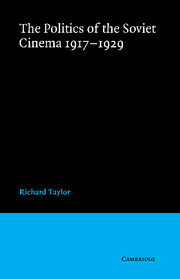Book contents
- Frontmatter
- Contents
- Preface
- Acknowledgements
- Note on transliteration
- Abbreviations
- 1 The pre-history of the Soviet cinema
- 2 The Bolsheviks, propaganda and the cinema
- 3 Revolution and Civil War
- 4 The disorganisation of organisation: the early twenties
- 5 The organisation of disorganisation: the later twenties
- 6 The Party takes control
- 7 Theory and film
- 8 Conclusions
- Notes
- Bibliography
- Index
5 - The organisation of disorganisation: the later twenties
Published online by Cambridge University Press: 07 October 2011
- Frontmatter
- Contents
- Preface
- Acknowledgements
- Note on transliteration
- Abbreviations
- 1 The pre-history of the Soviet cinema
- 2 The Bolsheviks, propaganda and the cinema
- 3 Revolution and Civil War
- 4 The disorganisation of organisation: the early twenties
- 5 The organisation of disorganisation: the later twenties
- 6 The Party takes control
- 7 Theory and film
- 8 Conclusions
- Notes
- Bibliography
- Index
Summary
The cinema is the only book that even the illiterate can read.
Soviet newspaper, 1924.Sovkino was faced with enormous tasks. At the centre it was required on the one hand to increase the quantity of Soviet film production so that the dependence on foreign imports could be first reduced and then eliminated; on the other hand Sovkino was expected to raise the quality of Soviet films which, in the circumstances, meant ensuring that the actual films produced were more closely tied to the ideological needs of the Party than had hitherto been the case. At the same time it was to concentrate on what were, for one reason or another, considered to be ‘priority areas’, the areas that had allegedly been neglected by Goskino and other Soviet film organisations. Sovkino was expected to provide cinema facilities and suitable films for the countryside, the network of workers' clubs, the armed forces and for the younger generation: in other words it was to ensure the allegiance of the pillars upon which the new state and society were supposed to rest. The problem was simply stated:
Here in Russia the cinemas are confined to the more or less large centres and aimed almost exclusively at the bourgeois classes. Even our urban workers are far from everywhere and always in a position to enjoy the benefits of the cinema, because the luxurious cinemas of the bourgeois type are inaccessible to them in terms of cost and uninteresting to them in terms of the content of the pictures, which here too are predominantly bourgeois.
The countryside however is completely unable to enjoy the benefits of the cinema.
- Type
- Chapter
- Information
- The Politics of the Soviet Cinema 1917–1929 , pp. 87 - 101Publisher: Cambridge University PressPrint publication year: 1979
- 1
- Cited by



